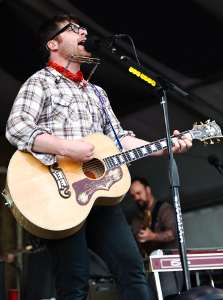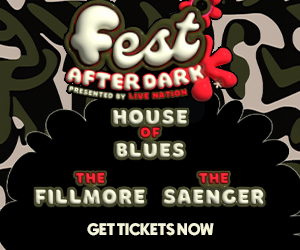For me, the best day of the fest so far. Everything I saw was interesting and some moments were spectacular. The notes:
— Saturday, the Big Freedia, Sissy Nobby and Katey Red performance showed one post-K direction for bounce, speeding it up, emphasizing the clatter and moving it toward electronic dance music—the audience Big Freedia’s tapped into on the road and the one reached by Scion, who released Big Freedia’s new EP. On Sunday, Partners-N-Crime were backed by a live band, and it was just as effective in its own way. The clear musical highlight was the set-closing “Footwork”, which had a go-go version of a second line beat. The combination was spacious but compelling. The young, predominantly white band behind PNC—who, like Saturday’s artists, couldn’t stay on the Congo Square Stage—was a reminder that for a generation of young New Orleanians, bounce was the underground music they grew up with, the music that sharpened their sense of being subversive and rebellious.
— Often jazz musicians introduce a composition and you have no idea how the introduction relates to the piece they play. For musicians (like writers), matching words to music is a very inexact science, and it’s a tribute to Tom McDermott and Evan Christopher that when McDermott identified a song as a “gospel waltz,” you understood what that meant in the first few bars.
— It was great to see Honey Island Swamp Band pack the Fais Do-Do Stage to near-uncomfortable capacity. While watching them, I thought about how much more I’d have liked Amos Lee the day before on Gentilly Stage if he’d have had a rhythm section like Honey Island’s.
— Dr. John’s Jazz Fest sets have sometimes seemed a little reserved, but Sunday’s show was a joy, and people I ran into around the Fair Grounds agreed. With Dave Bartholomew onstage and doing some of the best playing I heard from him in recent years, Dr. John said, “Right now, we’re going to play a Dave Bartholomew song that says a lot.” With that, the band launched into an almost unrecognizable rewrite of “The Monkey Speaks Its Mind” as swampy funk. Bartholomew’s trumpet rode on top of the groove like a sampled jazz part on a DJ’s trip-hop track, connected and disconnected at turns and more engaging for it.
— Speaking of trip-hop, Monk Boudreaux’s set on the Jazz and Heritage Stage had a similar vibe with an aggressive, percussion-heavy groove underneath Boudreaux’s obsessive chant of the phrase “Don’t run me down.” It was odd, free-floating and invited associations until he pinned it down: “This is Mardi Gras Day / This is my hometown / Don’t run me down,” and the line more clearly referred to the NOPD’s habit of trying to hurry second lines by driving up on the heels of the back of the parade. With that context, the phrase became a meditation on injustice as he brooded over the cops’ offense.
— Two things that made me happy: that even now and even at Jazz Fest, women throw panties onstage for Tom Jones, and that a guy doing zany hippie dances at the Decemberists was sufficiently committed to his crazy dance that he could outlast the guys who tried to mock him into submission by mimicking his moves.
— Was Sunday quietly one of the biggest days at Jazz Fest? In the last hours, Acura, Congo Square and Fais Do-Do were packed to capacity—Congo Square with crowds on the track, out the back and in the walkways between the marketplace tents. Could it be that a really big crowd was so well-distributed that it wasn’t obvious or uncomfortable?
— The combined star power of John Legend and Mos Def was too much for some women. When they came out together and started Legend’s “Used to Love You,” two women near me were so overcome that they went weak-kneed and fell.
— Colin Meloy of the Decemberists seemed to enjoy the relative intimacy of the Fais Do-Do Stage. A gregarious performer by nature, he applauded festgoers’ choices of headgear, wondered about the appropriateness of the setlist, explained the ins and outs of tuning patter and mocked drummer John Moen when he pushed a floor tom too close to the lip of the stage and it fell to the ground. “I like a drummer who understands gravity,” he quipped. He orchestrated a sing-along, at one point asking people to be so quiet “we can listen to the Roots.” But the set, like the recent album The King is Dead, never became about Meloy’s wit or cleverness, so as enjoyable as his banter was, it wasn’t better than the music, which reached back to Picaresque for “This Sporting Life” and “The Mariner’s Revenge Song” while leaning more on the more straightforward folk rock from the new album.





